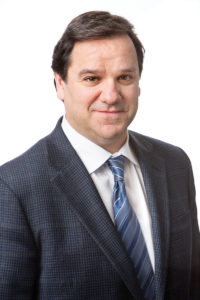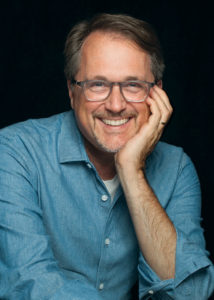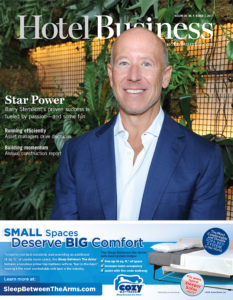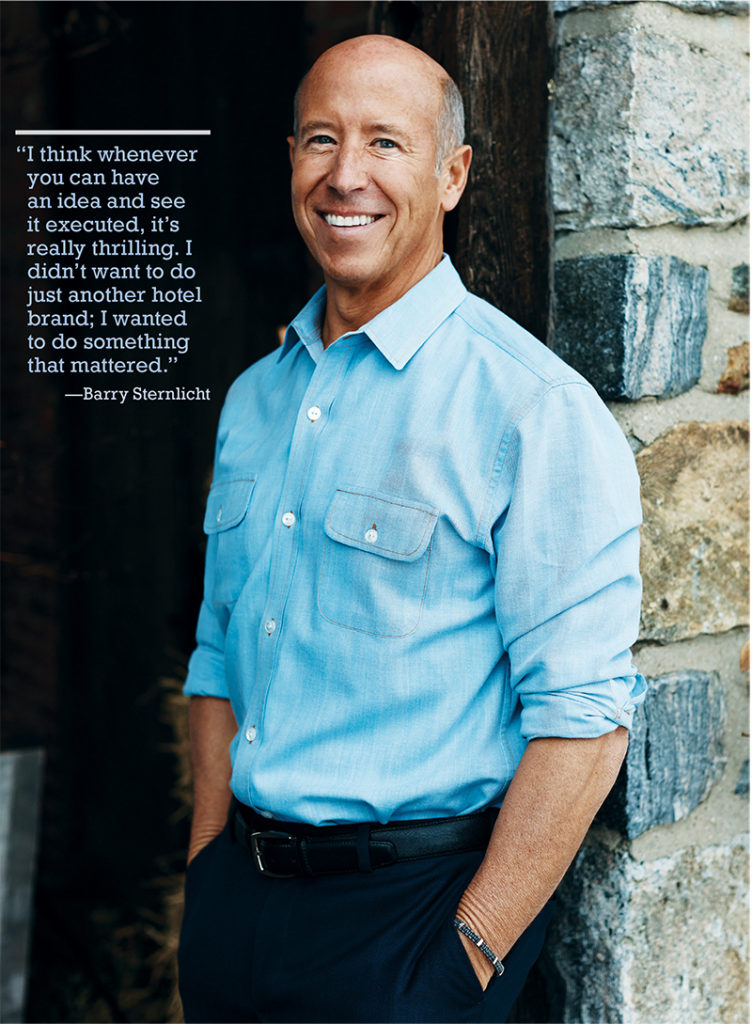 There are those in the industry who probably wish Barry Sternlicht would find a laurel bush somewhere and just rest on it. And there are probably those who wish he’d just sit on it. But the closest either of the two camps is going to get is maybe seeing the Starwood Capital Group chairman/CEO pull a not-quite-right leaf from the florascape at one of his 1 Hotels, the latest thorn in the side of luxury hotel competitors who murmur: “This can’t be happening. Again.”
There are those in the industry who probably wish Barry Sternlicht would find a laurel bush somewhere and just rest on it. And there are probably those who wish he’d just sit on it. But the closest either of the two camps is going to get is maybe seeing the Starwood Capital Group chairman/CEO pull a not-quite-right leaf from the florascape at one of his 1 Hotels, the latest thorn in the side of luxury hotel competitors who murmur: “This can’t be happening. Again.”
And one can almost hear Sternlicht’s sotto voce reply: “Hee-Hee.”
Not that that would be appropriate for the founder of a global conglomerate that over the past quarter century has acquired more than $84 billion in assets across nearly all major real estate asset classes, including hotels. But it’s right there that the fun does begin—at least for Sternlicht.
For while Starwood Capital Group (SCG) has significant investment weight into complementary platforms that include residential, retail, office, industrial, land, malls, energy infrastructure and oil and gas, its business line connected to hotels seems to make the CEO the most gleeful. In fact, when an observer asks if he gets as jazzed about a new subdivision or oil field as he does about hotels, Sternlicht laughs out loud.
A sense of humor, coupled with a savvy sense of style and the brains to back up a pioneering vision of how things could be, are among the attributes that have brought Sternlicht to the forefront of lodging mavericks. It’s also why he will be honored in Atlanta later this month with the eighth Hunter Conference Award for Excellence and Inspiration. The award was created to celebrate a lodging industry player “who has exemplified high standards in leadership, citizenship and innovation” and who has been “an inspiration to the industry.”
Sternlicht has a lot to smile about. On a recent Thursday afternoon, he was beginning to decompress from the day’s events—the grand opening of his third 1 Hotel and the environment-centric luxury brand’s first new-construction project, a 10-story, 194-key, glass-sheathed building overlooking the East River, the lower Manhattan skyline and the Brooklyn Bridge at the foot of Furman St. in Brooklyn’s Dumbo neighborhood. Up since 5:30 a.m., the lightly tanned executive—Sternlicht now lives in Florida—had let go of his sharply cut navy-blue suit jacket from the morning’s photo ops in favor of the white open-collar shirt beneath, playing down the corporate in favor of the casual.
For all the relaxed attitude, however, before he settled into one of the designer chairs in the hotel’s second-floor meeting space to address his next task, Sternlicht told an assistant to take a photo of the chair to show to someone at a later time.
It’s just what he does.
“This is fun for me, 1 Hotels. I’m financially secure and very successful at what I do, and my teams wish I did a lot less of this and a lot more of everything else I do,” said Sternlicht. “Probably from an economic standpoint, they’re 100% right. From a passion standpoint, I can’t help it. This is really fun for me; it’s not really work.”
With three properties opening in as many years in Miami’s South Beach, Manhattan (Central Park) and now in Brooklyn, the industry expectation is that Sternlicht is—again—putting his purse where his passion is with plans to expand the 1 Hotels brand. Indeed, plans already are under way for three new destinations: Haitang Bay in Sanya, China; Cabo San Lucas in Mexico; and in Silicon Valley, CA.
“I think whenever you can have an idea and see it executed, it’s really thrilling. I didn’t want to do just another hotel brand; I wanted to do something that mattered. And I wanted to do something that was a mission-driven business,” said Sternlicht, noting the nature-inspired brand concept was actually a pre-recession idea that did not pencil in several sites during the downturn.
“We stopped everything and then we started up again after the financial crisis. Miami came up and Manhattan came up as distressed deals, so we bought them and I said: ‘I know what we’re going to do,’” said the CEO.
Knowing what to do and when to do it is part of a skills set most C-suite executives covet.
For example, before the first guests even got a chance to lay down their heads in any of the 114 rooms and suites of the ultra-luxury Baccarat Hotel & Residences New York that opened in 2015 on West 53 St., SCG agreed to sell the nascent brand’s flagship hotel to an affiliate of Beijing, China-based Sunshine Insurance Group.
Earlier, SCG’s Distressed Opportunity Fund IX, in tandem with a limited partner, acquired Britain’s Principal Hayley Group and its collection of 22 grande dame hotels, including the under-renovation, block-long Hotel Russell in London, and a conference center, forming the foundation of a new SCG hotel brand, Principal. It then acquired the five-property Four Pillars Hotels in Oxford, then followed up with the acquisition of De Vere Venues representing 23 hotels as well as conference centers in London.
“Principal Hayley is fascinating because it had assets in most of the key gateway cities of the U.K. and there were these five-star assets that were in a two-star condition. They were horrible, the restaurants were horrible,” said Sternlicht. “I wanted to ‘Restoration Hardware’ them. I’ll probably just bring them back as stately, beautiful, English heritage hotels, which you actually can’t find anymore and nobody can easily do because the boxes don’t exist. Today we’re building the W in Leicester Square but it’s not going to compete with the Russell; it has completely different aesthetics.
“I’m really excited about what we’ve done. They’re fun and they’re going to do great. I think when you restore a building like that in the center of a city, you change the city. For example, the Manchester Palace went from sort of a dump to the hippest spot in town. I think the Russell will open April-May and I think people will be astonished.
“It’s not targeted ultra-hip, but it is super-comfortable, very beautiful and very affordable,” he added. “It’s been a really tremendous achievement and a great operation.”
And in a phased acquisition over two years, an affiliate of SCG picked up extended-stay company, InTown Suites, getting 138 hotels from Kimco Realty Corp. and 50 economy extended-stay locations from Mount Kellett Capital Management LP and partners.
“We’re renovating the whole enchilada, roughly 17,000 rooms. We’re also trying some new-builds,” said Sternlicht. “I think the first one will open in about 60 days. I’m kind of curious to see if it will work as a new-build. It’s a much nicer product that we’re building.”
Jon Pertchik, CEO, InTown Suites, sees the brand “growing by acquisition and new development, renovating and otherwise cleaning up the portfolio, while demonstrating to investors that InTown’s 90-day average length of stay, cash-flow stability and low overhead structure makes it more like an apartment portfolio than a hotel.”
Right now, SCG owns and SH Group (SCG’s hotel-management arm) manages the brand. As to franchising, Sternlicht said, “We would franchise probably, but we’ll have to see what the return on investment is.”
Steven Goldman, newly named CEO/director of FelCor Lodging Trust, who, immediately prior to the appointment was president of SH Group, described how Sternlicht’s push for innovation and excellence carries through on the management side.
“Barry’s innovative way of looking at things makes the management teams constantly question and challenge why things are done in a particular way and why they cannot be done differently. His strive for excellence does not just mean do what everyone else does better; it means do it the best it can be done and continue to seek perfection, which often means do it differently and dare to be great,” he said.
Asked how it was to work with Sternlicht, 1 Hotel Brooklyn Bridge General Manager Cornelia Samara, who had been with Hyatt Hotels for a number of years, termed him a visionary.
“He brings out the best in you. You really aim to be so excellent because you want to make him proud. I’ve known of Barry since over 20 years ago when I was working for The Royal Hawaiian hotel and it was taken over by Starwood. So for me, to be working 20 years later for such a man who is intelligent, brilliant, charismatic and who really has such a focus on detail and service and design and guest experience is very special,” she said.
The road and crossroads
Born on Long Island, Sternlicht and his family moved to Stamford, CT, when he was six. Growing up, Sternlicht’s father, Maurycy, a Holocaust survivor, worked as an engineer before starting his own business, and his mother, Harriet, taught biology, becoming a stockbroker later in life as her children went off to college.
A middle child of three sons (one sibling now a doctor, the other an entrepreneur), Sternlicht attended public high school before going to Brown University where he earned a bachelor’s degree, graduating magna cum laude. He later attended Harvard Business School, earning an MBA.
“If I look at my life, my determination came from my father and my creativity and love of the arts came from my mother,” said the CEO, adding his father passed away last year. “My mom, 83, is still very much alive and kicking,” he noted.
The CEO recalled how his father started the U.S. division of a French company called Wonder. “They made flashlights and equipment that made batteries,” he said, adding the division proved successful. At the time, the younger Sternlicht was teaching tennis and working at the flashlight factory where his job was to save the bulbs from defective flashlights. “I smashed them, then saved the bulb,” said Sternlicht with a grin. And perhaps subliminally planted the recycling seed that bloomed later in his eco-conscious life.
As the company became prosperous, the elder Sternlicht spent more time away on trade missions and community concerns. “I won’t say he took his eye off the ball, but he wasn’t paying as much attention as he should have to the business,” said Sternlicht. “Inventory went missing and they blew the bank covenants and the company filed. So it went bankrupt and it turned out the building he bought for them in Norwalk, CT, was worth more than the company. It was liquidated and the company was liquidated. So, one of my business philosophies is worry about the downside and let the upside take care of itself.”
Undaunted, Sternlicht’s father decided at age 67 to take the Series 7 exam (aka General Securities Representative Exam) joining his wife as a stockbroker.
Unlike many of today’s travel-savvy, rollie-toting children, Sternlicht’s travel experiences as a youngster consisted of numerous road trips to Florida to visit his grandparents. “Mostly those were driving vacations. You know—my parents would fight and we’d sit in the back seat of the station wagon and then you’d find out how big the state of Florida is. You’d see Welcome to Florida and you’d think you’re there. Then you’ve got to drive another 500 miles,” said Sternlicht.
His first “big” trip at around age 16 was to California where the family went to Yosemite. “And I went to Europe once,” he recalled. “My father, being European, was not social. He was kind of reserved. We didn’t do a lot. My dad didn’t golf. I didn’t go to camp. I worked.”
The lessons learned as his parents’ son are not lost on anyone who has watched the trajectory of Sternlicht’s career.
Starting out at consulting firm Booz Allen [Hamilton], Sternlicht then became an arbitrage trader before being accepted into Harvard to complete his education. “I was completely shocked; I was sure I was going to fail. But I went. I accepted. I told my boss and he threw me out of the office. So I went to Harvard and it turned out I had a lot of common sense. That was my great competitive skill set. And talking’s never been a problem for me. I really, really liked business school. I wanted to get a job in private equity but nobody would hire me because I didn’t have any math background. So I decided to go into real estate,” he said. “I was offered a job at Goldman Sachs but I just didn’t want to live in New York; I’m kind of a Connecticut boy. The two years I lived in New York after Brown I was broke. The city is so expensive. I was making $24,000 and if I went on a date and she ordered lobster, I didn’t eat for a week.”
Getting a job offer from JMB Realty Corp. Sternlicht moved to Chicago, working with Neil Bluhm and Judd Malkin for six years before he was laid off due to the economy.
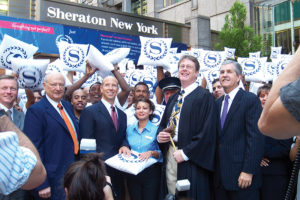
The late Mayor Edward I. Koch (left) was on hand in 2002 at the Sheraton New York when then-Starwood Hotels & Resorts CEO Barry Sternlicht launched the Sheraton Service Promise, which addressed on-property guest problems.
His rebound was to create Starwood Capital in 1991 at the age of 31, launching SCG’s first opportunity fund (it closed its tenth opp fund in 2015). A few years later, hotels caught his attention and Starwood Lodging Trust was established, preceding the founding of Starwood Hotels and Resorts. Sternlicht grew the hotel portfolio via strategic acquisitions, e.g., ITT Corp. and Westin Hotels and Resorts, the expansion of brands (Four Points by Sheraton), the repositioning of St. Regis (from one hotel to a global luxury brand), and the creation of a mainstream boutique brand (W). He also changed the guestroom focus not only for his hotels, but for the lodging industry overall, with the creation of the Westin Heavenly Bed and Heavenly Bath. He led the hotel company as CEO from 1995 to 2004, before stepping down, then yielded his executive chairmanship in May 2005.
Sternlicht then came back full circle to his investment roots to head up SCG, where thus far two global hospitality funds have been raised and closed.
Asked how he felt regarding the Marriott/Starwood merger, Sternlicht said, “I wanted Marriott to buy it. It’s actually a merger I proposed when I left. I went to see Bill Marriott and Arne [Sorenson] and I said: ‘You should buy us.’ They thought I was kidding. I was deadly serious. I even said I would roll my stock. I thought it was a killer merger back then. I thought scale mattered. I thought we could take on the intermediaries, the Expedias, the OTAs and define our space. I would say they missed that opportunity. It would have been a ‘crusher’ merger. But they got to it 12 years later. I didn’t really want Anbang to buy the company. I kind of think it’s found a home.”
Sternlicht said he grew up hoping that some day he’d have a pool. “My neighbor had a pool and I wanted a pool and if I really got lucky, I’d have a tennis court. So those were my two goals in life: have a house with a pool and a tennis court. That I thought would be the definition of success,” said Sternlicht. “Somewhere along the line I think I passed that.”
As to winning the Hunter Award, Sternlicht said, “You need to figure out what excellence is then you can achieve it. But you have to be cognizant of how you define excellence, benchmarking not only against your industry but best-in-class players in every function of your company… It’s not just Marriott, Hilton, Starwood. It’s actually reaching outside your comfort zone and then moving the bar as the world changes. You can’t rest on your laurels. I’m worried much more today about the macro world. When I was younger I probably just focused on what I was doing. And now, because of my bully pulpit and the scale of what we do today, I worry about politics and interest rates and currencies and governments; that stuff keeps me up at night. The world is moving so fast and making sure we’re not road kill. That we don’t get run over by something that happens in the global climate is really important.” HB
Inspiring the troops with excellence
Hotel Business reached out to three key executives at Starwood Capital Group to get a sense of how their boss, Barry Sternlicht, engenders “excellence” and delivers “inspiration,” the hallmarks of the Hunter Hotel Investment Conference Award he is receiving later this month.
According to Ellis Rinaldi, EVP/co-general counsel; Kemper Hyers, SVP/head of design; and Jon Pertchik, CEO of InTown Suites, the SCG CEO fills the bill across multiple levels. Here are their anecdotes.
What is the most interesting interaction you’ve had with Barry?
Rinaldi: If forced to point to one moment, perhaps it was in 1994 at a Starwood Capital corporate retreat. Barry had us go around the table and discuss what we each were working on. Barry went last and said he bought some stock in a near-bankrupt public company, whose stock plummeted from $15 a share to nearly $1. Everyone laughed. Then Barry said he bought more than half the company’s debt and that the company may go belly up and we could lose the entire investment, making it the worst investment of his life. He now led the laughter. Then, with a twinkle in his eyes he said—and the room got silent—“Or it may be my best investment ever.”
Well, we took control of that company in early 1995, merged a few more companies into it, and made our investors a boatload of money. The company? Hotel Investors Trust, which we renamed Starwood Hotels.
It is tough to point to one interaction as the most interesting that I have had with Barry, since I have been with him for more than 25 years. Rather, I will say it has been incredibly interesting to work with and observe for 25-plus years the greatest Renaissance man of our generation… Barry’s amazing interpersonal skills and gravitas make people want to do deals with him.
Hyers: Barry is my guide for the consumer; he thinks about them first and foremost and can channel them with incredible intuition.
A simple example was in our Baccarat [hotel]project. The lobby, our Grand Salon, was designed as a single space with a very discrete division. There was some abstract design concept I had pursued that required the direct connection of these spaces.
Barry walked in to a design review late in the process and asked, “Why aren’t these two separate rooms? They could be rented, the scale is so much better, people will love this intimate room.” I hemmed and hawed and even built a scale model to disprove his point. But in the end he was utterly right.
We separated the rooms and created one of the most flexible, most beautiful rooms in the hotel—the most photographed and loved by guests and gawkers alike. Barry just knew this intimacy and this sense of a private space adjacent to the grand public space was the right gesture. My scheme would have dissipated the energy and killed both rooms.
Pertchik: I have had many interactions that reveal Barry’s both brain hemispheres function at the highest levels—meaning he has an extraordinary eye for design (creativity) while also is a financial engineering guru (logic and reason). He can select the best scent for an environment while running an IRR calculation off the top of his head and get it mathematically correct. For instance, I recall one time where Barry—the chairman of a $56-billion, prestigious private-equity group—literally required we use purple pillows in one of our Miami or L.A. properties. We were all amazed that a guy so successfully running something so enormous in scale and value could lead that big ship while still being excellent at selecting pillow colors.
What has surprised you about working at/with SCG?
Rinaldi: What has surprised me about working at Starwood is that it never gets boring or routine. We are constantly evolving, and adapting and responding to market conditions, investing in different asset classes, different locations, structuring deals differently, constantly learning, maturing and improving as a company and as investors and individuals. Occasionally, I reflect and look five years back in time, and I find that I am always doing something so uniquely different now than I was just five years earlier.
Hyers: It is a start-up even after decades. I am always delighted about how free we are to contribute. To opine. To direct the work. The company reinvents itself naturally and constantly.
Pertchik: I am now CEO of my second SCG company. I used to think of SCG as a U.S. hotel/real estate private equity group. Over time, I was really surprised by SCG’s reach and breadth. [It] invests all over the globe and is truly a global platform.


